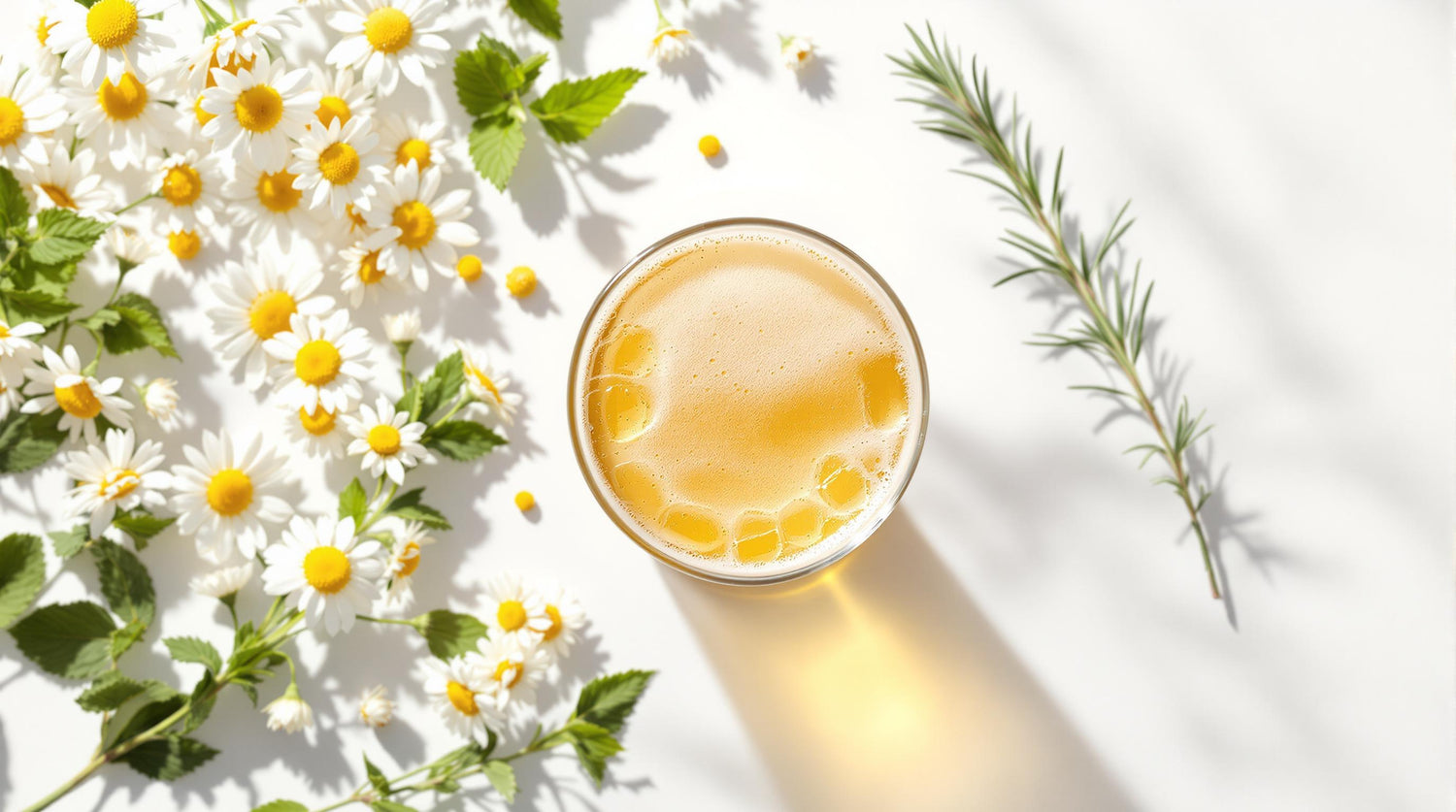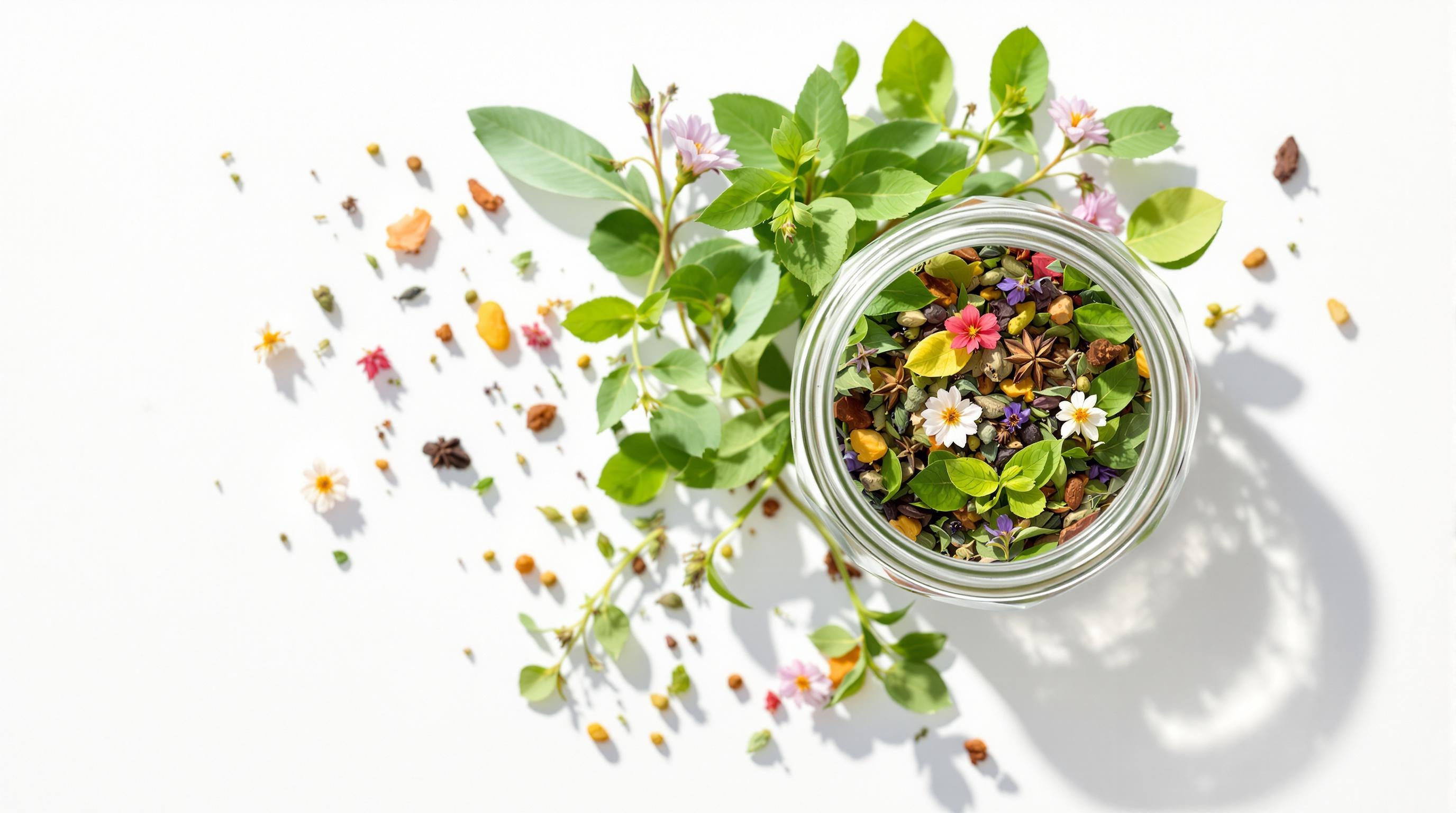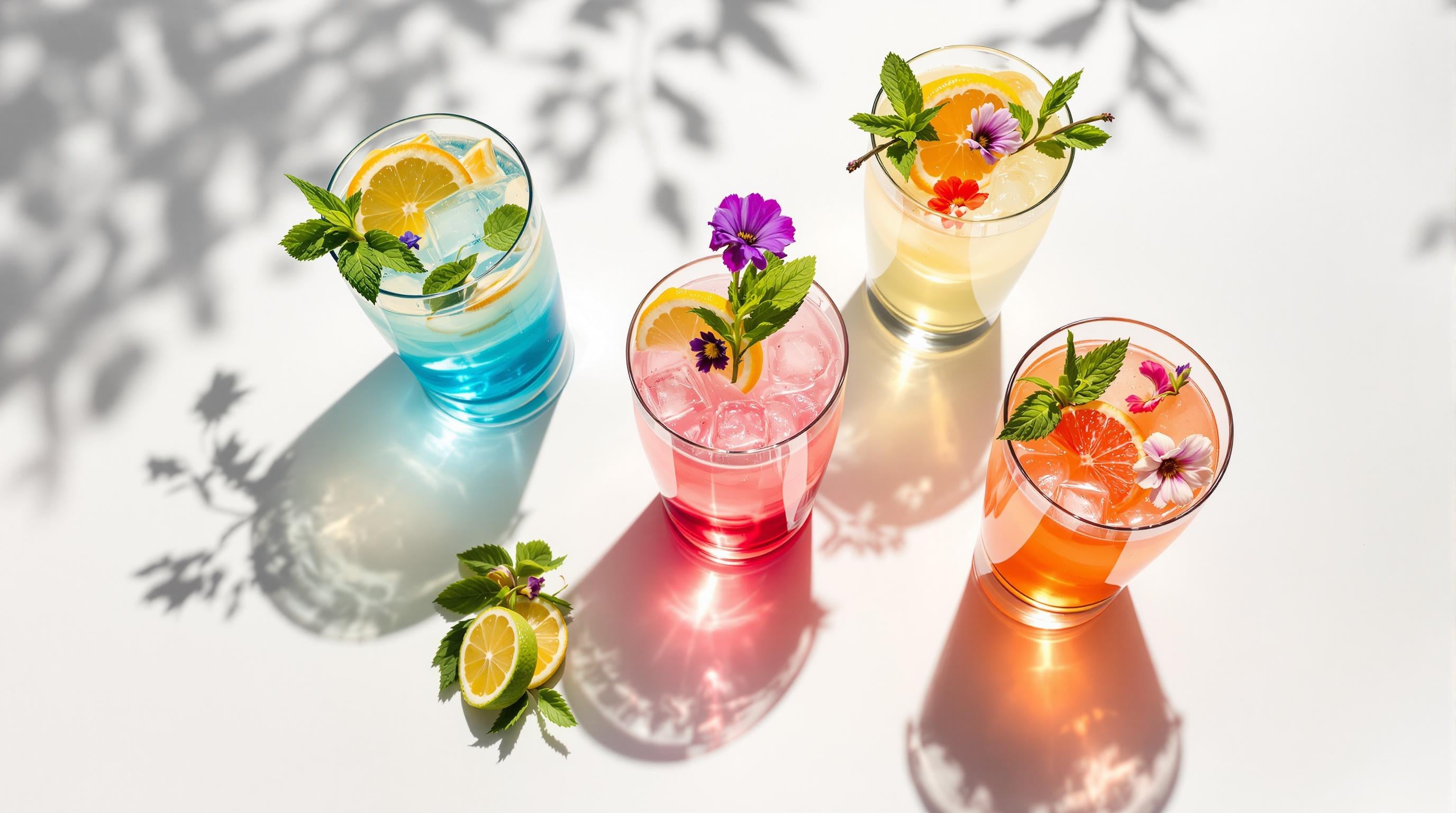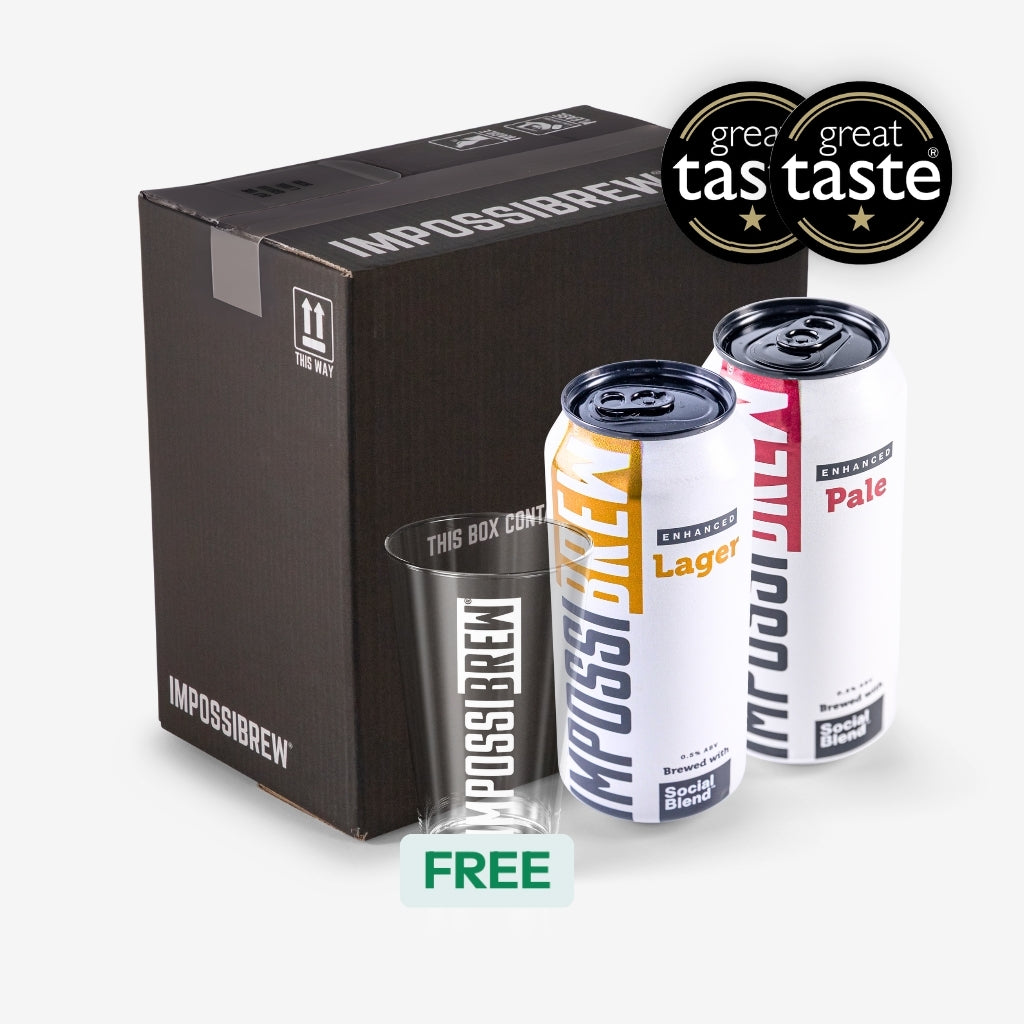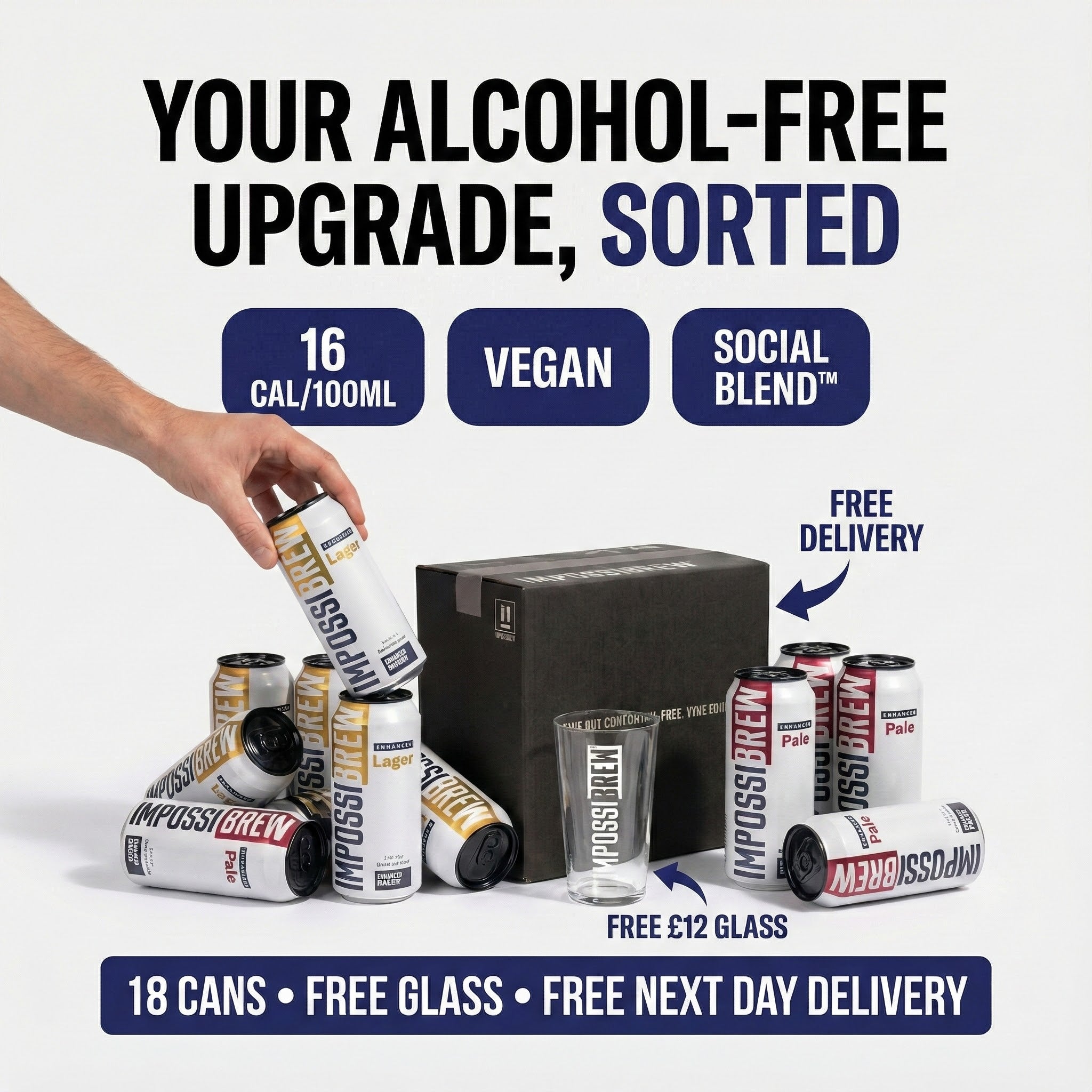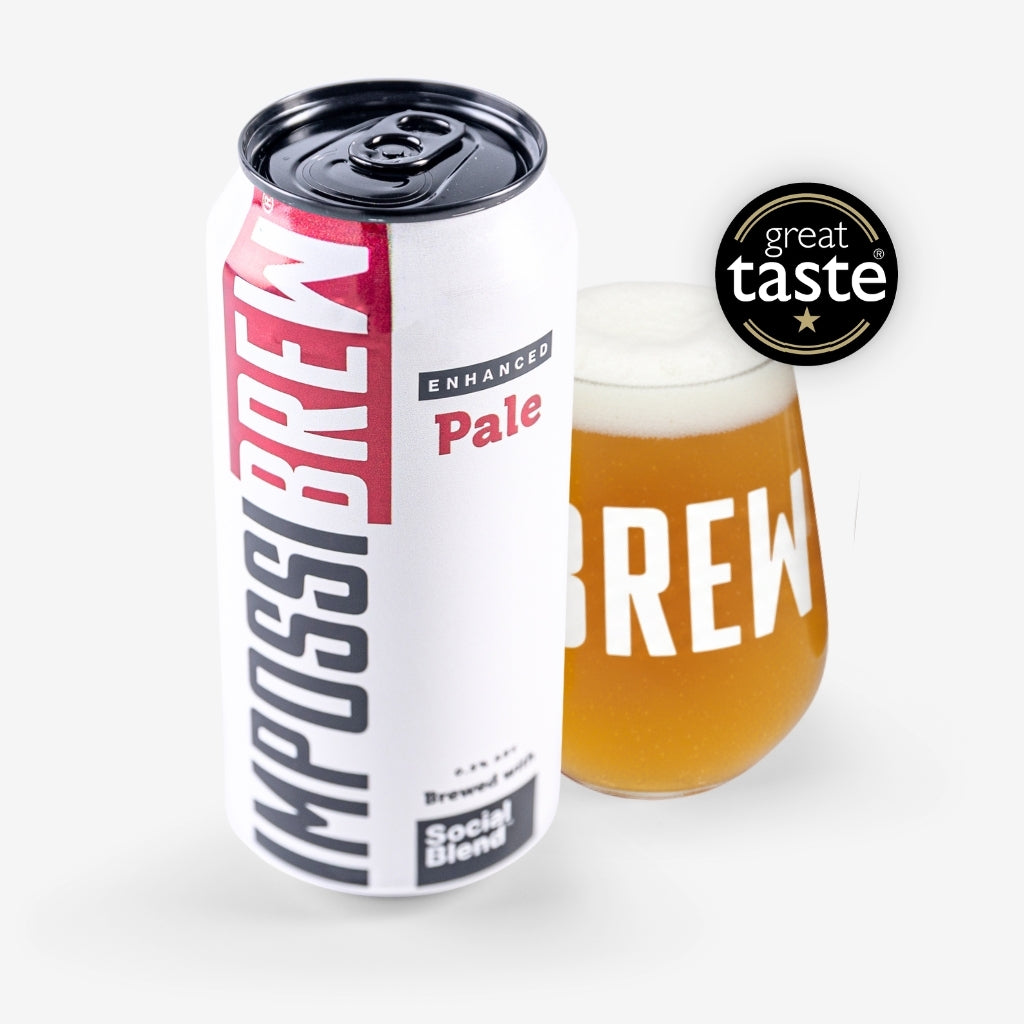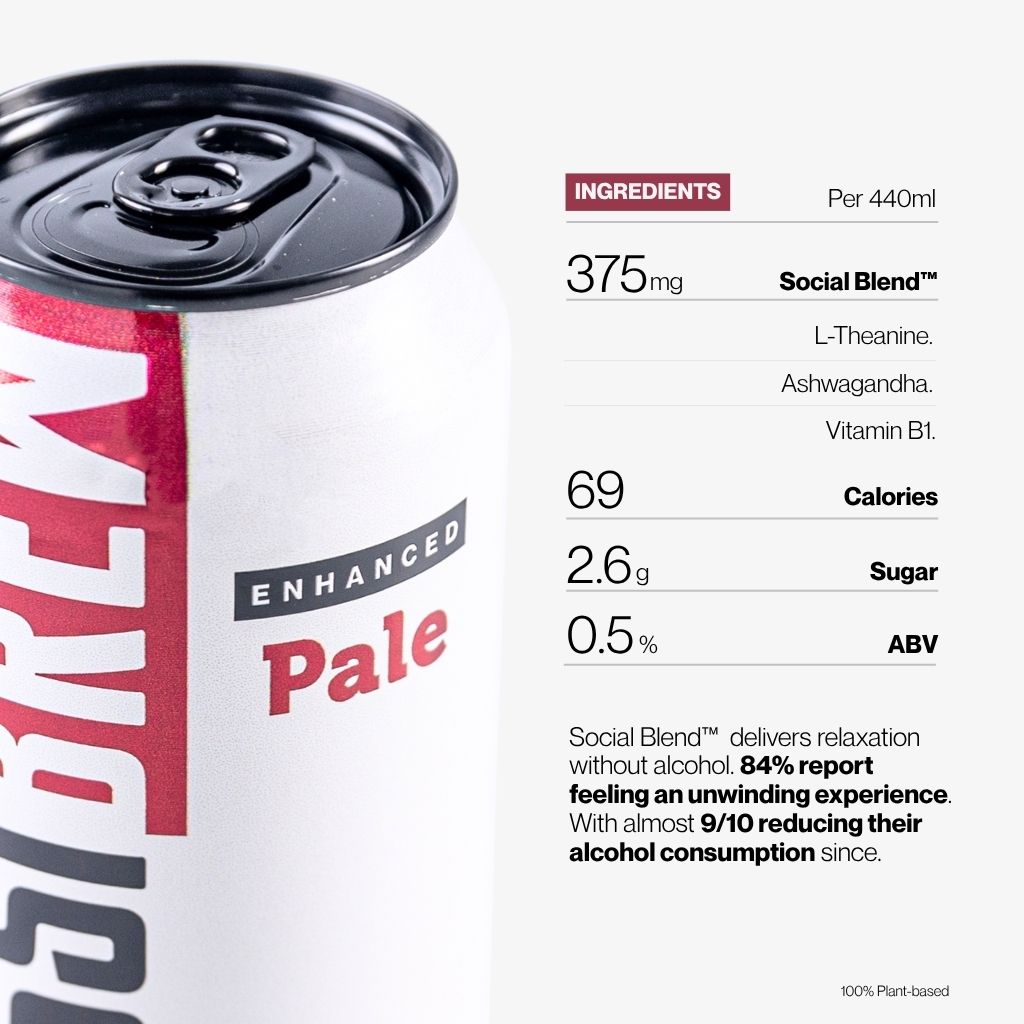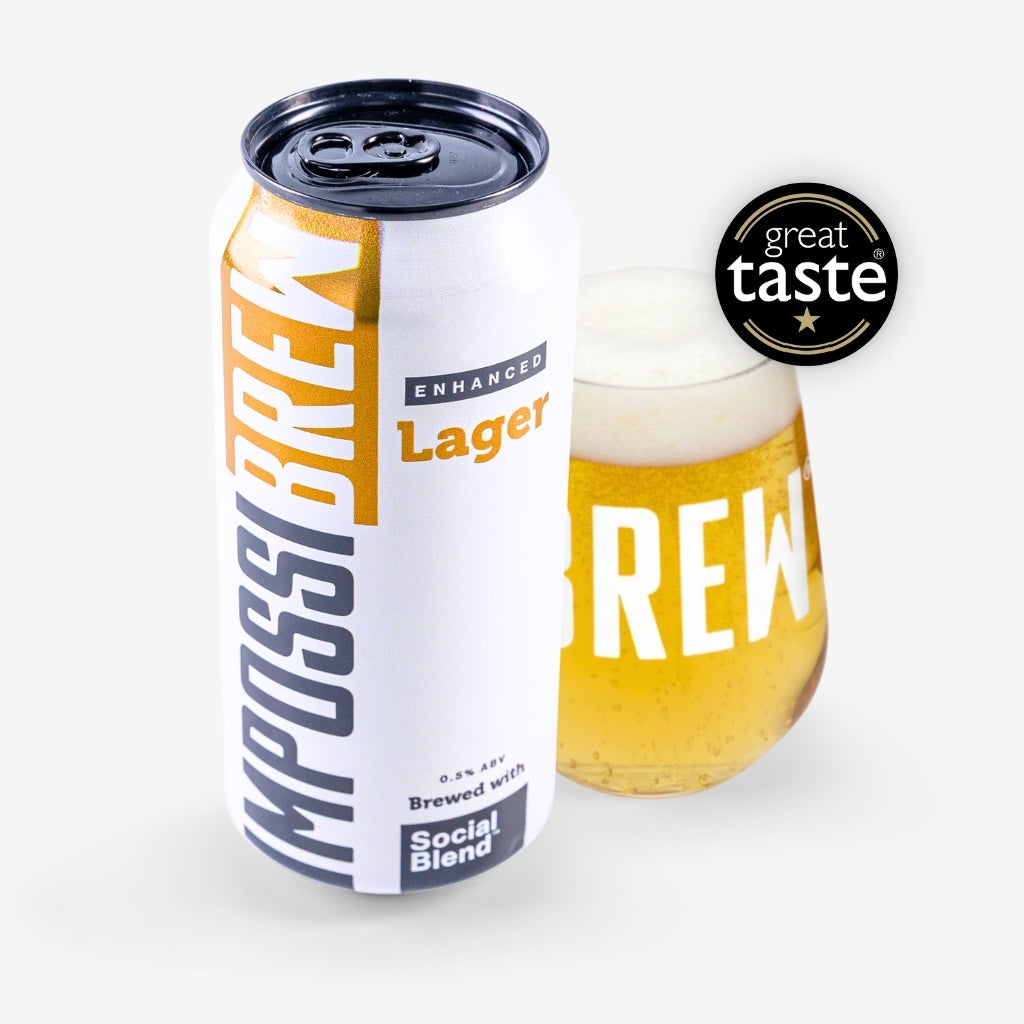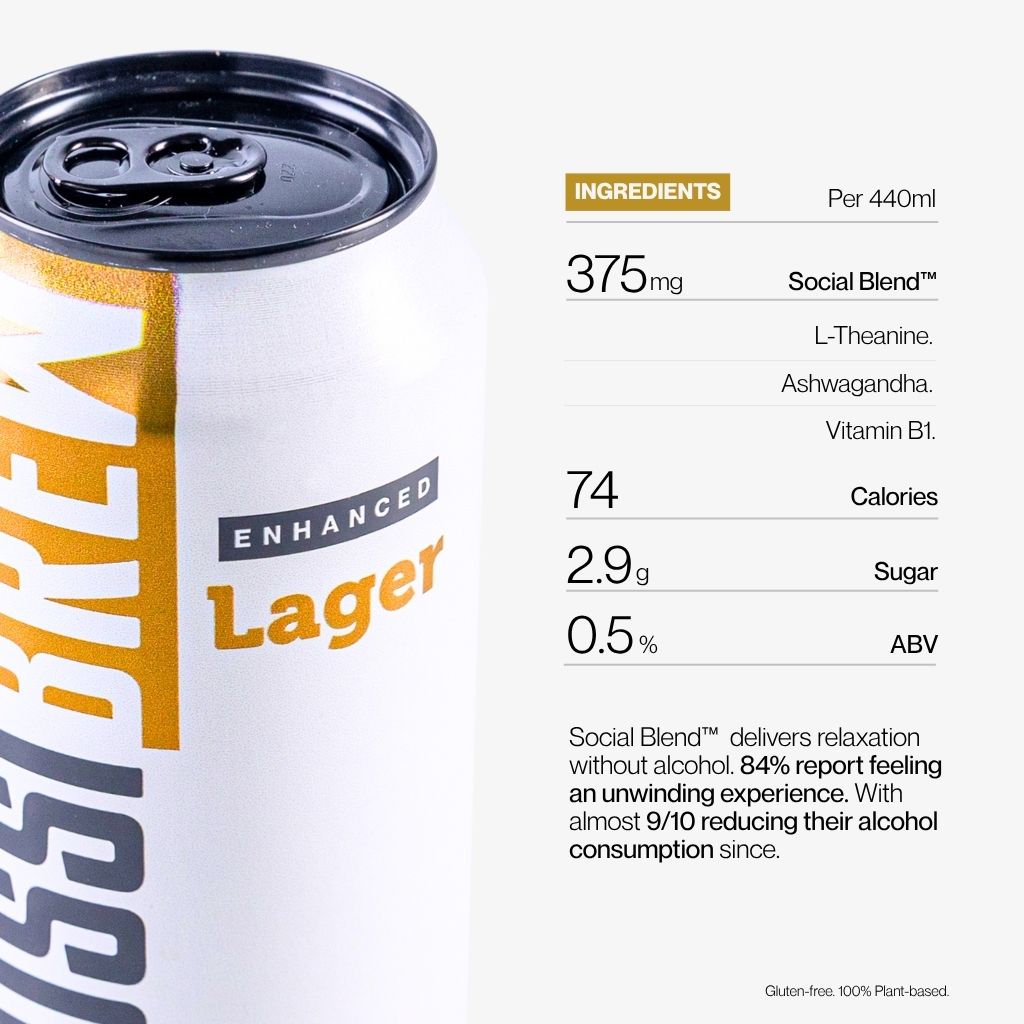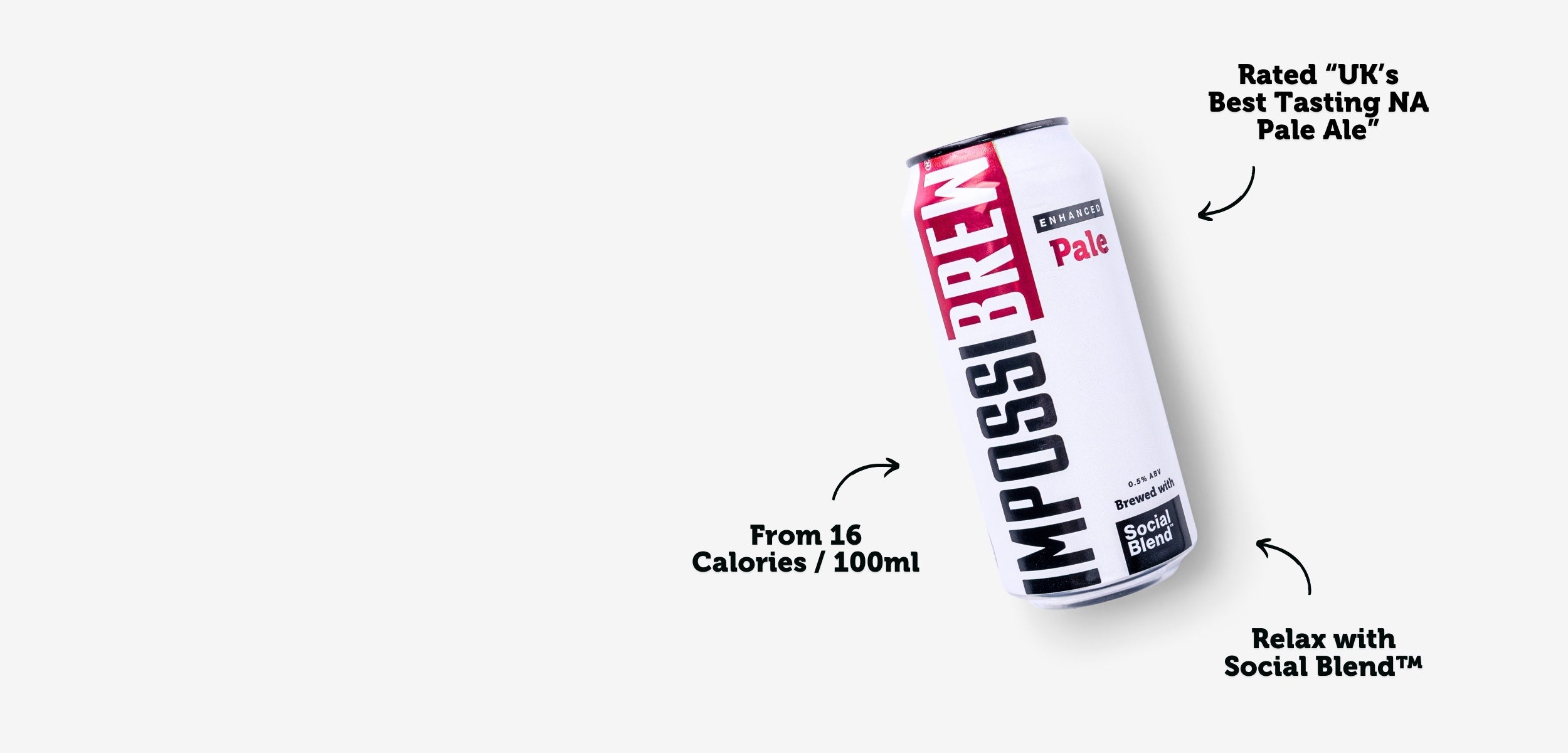Non-alcoholic beers with herbal blends are designed to mimic the relaxing effects of alcohol while promoting mental well-being. Ingredients like hops, ashwagandha, and L-theanine interact with the brain and body to reduce stress, improve mood, and enhance sleep quality. These beverages cater to the growing demand for healthier, functional drinks.
Key Takeaways:
- Hops: Boosts GABA levels for calmness and better sleep.
- Ashwagandha: Lowers cortisol and supports stress management.
- L-theanine: Promotes relaxation without drowsiness.
- Market Growth: The adaptogen drink market is projected to reach $3 billion by 2026.
Research highlights their potential to improve mood, reduce anxiety, and aid sleep, but long-term effects and dosage guidelines need further study. Consumers should use these beverages cautiously, especially if on medication or managing health conditions.
Science of Herbal Blends
Body and Brain Effects
Herbal blends in non-alcoholic beers are crafted to mimic the relaxing effects of alcohol by interacting with specific biological systems. For example, L-theanine supports alpha brain wave activity, encouraging relaxation without causing drowsiness, and boosts mood through serotonin pathways.
Research into hop-derived compounds, especially matured hop bitter acids (MHBAs), reveals they stimulate the vagus nerve via brain-gut interactions, which can help improve mood. In a study with 97 participants, consuming 35 mg of MHBAs daily for three weeks led to noticeable reductions in anxiety and depression [1].
Each herb used in these blends brings its own properties, creating a combined sensory and physiological experience.
Main Herbs and Functions
Modern non-alcoholic beers include several well-researched herbs:
- Hops (Humulus lupulus L.): Beyond adding flavor, hops increase GABA levels in the brain, a neurotransmitter linked to calmness and better sleep. Research on shift-working nurses showed that hop-infused non-alcoholic beer reduced sleep latency from 20.50 to 12.01 minutes and lowered nighttime activity by 27% [2].
- Ashwagandha: Known for its stress-relieving and cognitive-boosting effects, this herb helps the body manage stress effectively.
- L-theanine: This compound promotes calmness without sedation by influencing brain wave patterns and works in synergy with other herbs for enhanced relaxation.
The table below highlights the specific roles and measurable benefits of these herbs.
Herb Effects Comparison
| Herb | Primary Function | Measured Effects | Timeframe |
|---|---|---|---|
| MHBAs (Hops) | Mood Support | 13.9% drop in total mood disturbance | Effects seen after 29 days |
| Ashwagandha | Stress Management | Lowers cortisol, improves sleep quality | 2-8 weeks |
| L-theanine | Relaxation | Boosts alpha brain wave activity | 30-40 minutes |
| Holy Basil | Stress Adaptation | Improves mood, reduces anxiety | 2-4 weeks |
Research continues to explore how combining traditional brewing with modern techniques can produce effective, non-alcoholic alternatives that deliver both enjoyment and mental well-being [2].
Research Evidence
Study Results
Clinical research suggests that herbal blends in non-alcoholic beers can positively influence mood and relaxation. For instance, a 29-day study involving 97 participants consuming beer with 35 mg MHBAs demonstrated steady improvements in mood scores:
| Assessment Day | Mean Score (±SD) | Improvement |
|---|---|---|
| Day 1 (Baseline) | 51.8 ± 8.3 | - |
| Day 15 | 47.1 ± 6.7 | 9.1% |
| Day 29 | 44.6 ± 7.4 | 13.9% |
Additionally, prior research involving female nurses showed noticeable improvements in sleep quality metrics [2].
While these findings are encouraging, there’s still much to explore in this area, leaving room for further investigation.
Research Gaps
Current studies highlight several areas that need more attention:
- Long-term effects and how individuals may respond differently
- Establishing standardized dosages for herbal ingredients
- Understanding interactions between botanical compounds
- Examining how brewing methods affect the absorption of active ingredients
Though these gaps exist, the findings so far offer useful insights, summarized below.
Research Summary Table
| Study Focus | Key Findings | Sample Size | Duration | Primary Outcomes |
|---|---|---|---|---|
| Mood Enhancement | 13.9% improvement in total mood state | 97 adults | 29 days | Better mood |
| Sleep Quality | 40% decrease in sleep latency | 17 nurses | 14 days | Improved sleep |
| Anxiety Reduction | 12.5% decrease in state anxiety | 17 participants | 14 days | Greater relaxation |
| Cognitive Function | Enhanced focus and mental clarity | 50 adults | 21 days | Better performance |
"Moderate consumption of non-alcoholic beer, particularly due to its hop content, supports better sleep and overall well-being." - Lourdes Franco, Researcher
Dr. Paul Chazot, a biosciences professor at Durham University, has highlighted the potential of these herbal blends as effective alternatives to alcohol. He points out their ability to meet modern wellness demands while still offering a socially enjoyable experience [2][3].
These findings suggest that herbal-infused non-alcoholic beers could evolve into functional beverages aimed at supporting mental health and overall wellness.
Related video from YouTube
sbb-itb-a752bf8
Safety and Guidelines
Herbal blends in non-alcoholic beers can offer a lot, but using them safely and correctly is key to getting the most out of them.
Health Considerations
Herbal non-alcoholic beers can sometimes lead to side effects or interact with medications. Here's what to keep in mind:
| Health Factor | Details | Who's Affected |
|---|---|---|
| Medication Interactions | May interfere with blood thinners or antidepressants | People on prescription medications |
| Allergic Reactions | Could trigger sensitivity to herbal ingredients | Individuals with known herb allergies |
| Dosage Sensitivity | May cause stomach upset or drowsiness | Those sensitive to botanical compounds |
| Medical Conditions | Could affect blood pressure or hormone levels | People with pre-existing conditions |
Legal Requirements
The European Food Safety Authority (EFSA) has strict rules for herbal ingredients in non-alcoholic beers. These include labeling standards and safety checks. Any health claims made on these products need EFSA approval.
Consumer Guidelines
To enjoy herbal non-alcoholic beers safely, follow these tips:
- Start with small amounts to gauge your tolerance.
- Pay attention to how your body reacts to specific herbs.
- Speak with your doctor if you're on medication.
The EFSA also advises checking product labels for clear ingredient details and approved health claims.
While recent findings suggest herbal non-alcoholic beers are generally safer than their alcoholic counterparts, it's important to consume them thoughtfully, especially if you have health concerns. Following these guidelines can help you enjoy these beverages with confidence.
Industry Outlook
The herbal non-alcoholic beer market is evolving quickly, with the adaptogen drink industry expected to hit $3 billion by 2026 [1].
Research Needs
Key areas still need deeper exploration, such as long-term health impacts, potential drug interactions, and consistent testing methods. Researchers at Durham University are currently studying specific herbal combinations for their potential to promote relaxation and improve mood [2][3].
| Research Priority | Current Status | Future Focus |
|---|---|---|
| Long-term Effects | Limited studies exist | Extensive health studies |
| Drug Interactions | Only initial findings | Compatibility research |
| Standardization | Inconsistent methods | Unified testing protocols |
These ongoing studies are paving the way for new possibilities in herbal formulations.
New Uses
Brands like Three Spirit and TRIP are branching out, bringing herbal blends into fresh beverage formats with adaptogens and medicinal mushrooms [1]. This diversification is being matched by advancements from major players in the field.
Market Leaders
Companies such as IMPOSSIBREW® are leading the charge with innovations like their Social Blend™ technology. This patent-pending approach combines nootropics and adaptogens with brewing techniques, backed by scientific collaboration with Dr. Paul Chazot [2][3].
The industry is placing greater importance on rigorous testing to confirm product effectiveness. A growing trend toward personalized blends is also emerging, with companies experimenting with different herb combinations to achieve targeted outcomes. These scientific developments are helping position herbal non-alcoholic beers as a credible option in the functional beverage market.
Summary
Research Findings
Studies have shown that herbal blends in non-alcoholic beers can help with relaxation and improving mood. Research from Durham University provides strong evidence for these effects [2][3].
"Our research confirms that adaptogenic compounds can deliver relaxation benefits without alcohol's downsides." - Dr. Paul Chazot, Professor of Biosciences at Durham University [2][3]
Safety Points
Ensuring consumer safety is crucial when it comes to herbal non-alcoholic beers. It's important to consider potential interactions and take precautions. Consumers are advised to consult healthcare professionals, follow usage instructions, and be particularly cautious if pregnant or managing health conditions.
Market Growth
The non-alcoholic beverage market is growing steadily, with the adaptogen drink segment expected to hit $3 billion by 2026 [1]. This growth is fueled by innovation, as companies combine traditional brewing techniques with modern botanical science. Brands like IMPOSSIBREW® are at the forefront, using proprietary blends to lead this shift [2][3]. This trend highlights a movement toward beverages that combine enjoyment with wellness benefits.

